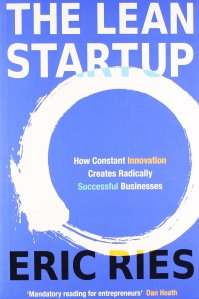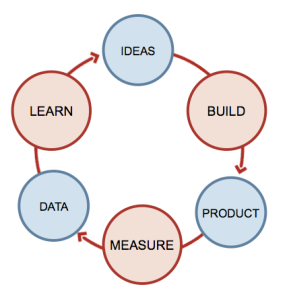Recently, I read The Lean Startup having seen it mentioned several times on popular websites and blogs, as well as by entrepreneurs at events I had attended. The book is written, and the movement pioneered, by Eric Ries, co-founder of IMVU; the company that created and popularised 3D avatars. The book draws largely from his experiences with the company and he does not hide his mistakes at IMVU in order to share the lessons learned. He comes from a technical background, was Chief Technical Officer at IMVU from 2004 to 2008, before leaving to move into investment with Kleiner Perkins. He now acts as business advisor to many startups (and large corporates), proposing the Lean Startup philosophy as a means to achieve “constant innovation”.
To summarise the books content, The Lean Startup aims to turn the art of innovation into a streamlined scientific process. Eric advocates the use of processes such as small batch production and innovation accounting to better build, test and measure startup products. The goal is to ultimately increase the success of innovation and reduce the risk of going it alone.
I expected big things, given the praise the book has received from founders, investors and academics alike; Marc Andreessen and Randy Komisar to name just two.
The book is my no means a disappointment…kind of. The book has some great stuff, delivering fantastic ideas and plentiful examples to support them. The problem is, it does so over more than 280 pages of somewhat repetitive content. Given the group of people the book is aimed at; founders, entrepreneurs, CEOs etc. I think the length of the book is a misjudgement. I for one, started to feel somewhat frustrated by the lack of pace and repetitiveness by about half way.
The strength of the book is perhaps in its examples, that really serve to convince you of the effectiveness of the Lean principles. They also add a lot of extra pages however, with each additional example becoming superfluous.
Some of the principle ideas that the book emphasises, are well discussed elsewhere, and in a more concise way. For example, you can read about the benefits of a Minimum Viable Product in 5 minutes.
I am not alone in my reservations of the book either. I spoke to Courtney Boyd Myers, founder of audience.io and part of the great team at Makeshift studio, who said something to the extent of - “I had the book on audio and I got what he was saying by about half way”. It is ironic that a book highlighting the power of Lean is somewhat heavier than is needed, fat where it should be thin. I prefer the style of abookapart, whose books emphasise great content over as few pages as possible.
Overall, the ideas in the book are definitely worth knowing, I’m just hesitant whether reading the whole book is the best way of getting them. My suggestion, find someone who has read the book and discuss it over a 20 minute coffee.
7/10

